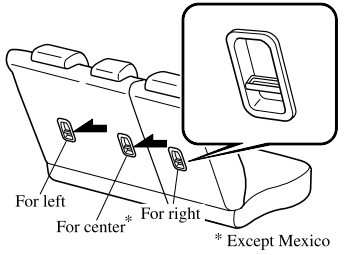Mazda CX-3: Tires / Tire Inflation Pressure
WARNING
Always inflate the tires to the correct pressure: Overinflation or underinflation of tires is dangerous. Adverse handling or unexpected tire failure could result in a serious accident. Refer to Tires.
Use only a Mazda-genuine tire valve cap: Use of a non-genuine part is dangerous as the correct tire air pressure cannot be maintained if the tire valve becomes damaged. If the vehicle is driven under this condition, the tire air pressure will decrease which could result in a serious accident. Do not use any part for the tire valve cap that is not a Mazda-genuine part.
Inspect all tire pressures monthly (including the spare) when the tires are cold. Maintain recommended pressures for the best ride, handling, and minimum tire wear.
Refer to the specification charts.
NOTE
- Always check tire pressure when tires are cold.
- Warm tires normally exceed recommended pressures. Do not release air from warm tires to adjust the pressure.
- Underinflation can cause reduced fuel economy, uneven and accelerated tire wear, and poor sealing of the tire bead, which will deform the wheel and cause separation of tire from rim.
- Overinflation can produce a harsh ride, uneven and accelerated tire wear, and a greater possibility of damage from road hazards.
- Keep your tire pressure at the correct levels. If one frequently needs inflating, have it inspected.
 Tires
Tires
For reasons of proper performance, safety,
and better fuel economy, always maintain
recommended tire inflation pressures and
stay within the recommended load limits
and weight distribution...
 Tire Rotation
Tire Rotation
WARNING
Rotate tires periodically: Irregular tire wear is dangerous. To
equalize tread wear for maintaining good
performance in handling and braking,
rotate the tires every 12,000 km (7,500
miles)...
Other information:
Mazda CX-3 (2015-2026) Owner's Manual: Trip Computer and INFO Switch (Some models)
The following information can be selected by pressing the INFO switch with the ignition switched ON. Distance-to-empty mode Average fuel economy mode Current fuel economy mode Average vehicle speed If you have any problems with your trip computer, consult an Authorized Mazda Dealer...
Mazda CX-3 (2015-2026) Owner's Manual: Wiper Blades
CAUTION Hot waxes applied by automatic car washers have been known to affect the wiper's ability to clean windows. To prevent damage to the wiper blades, do not use gasoline, kerosene, paint thinner, or other solvents on or near them. When the wiper lever is in the AUTO position and the ignition is switched ON, the wipers may move automatically in the following cases: If the windshield above the rain sensor is touched...
Categories
- Manuals Home
- Mazda CX-3 Owners Manual
- Mazda CX-3 Service Manual
- Trip Computer and INFO Switch (Some models)
- Recommended Oil
- Speedometer
- New on site
- Most important about car
Anchor Bracket
Anchor brackets for securing child-restraint systems are equipped in the vehicle. Locate each anchor position using the illustration.
To install a child-restraint system, remove the head restraint. Always follow the instruction manual accompanying the child-restraint system.
Anchor bracket location
Use the indicated anchor bracket locations when installing a child-restraint system equipped with a tether.

